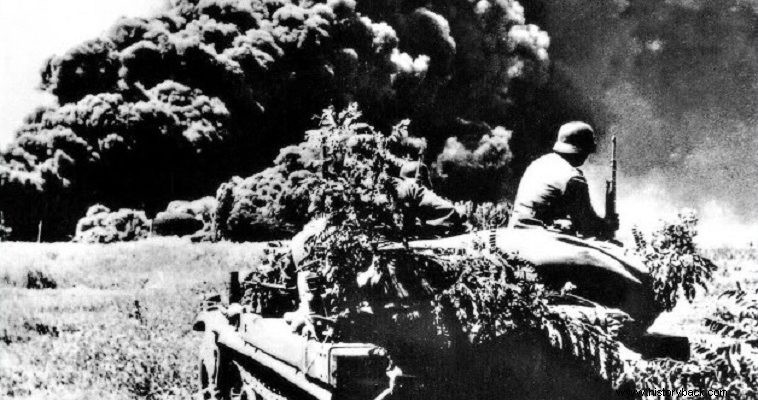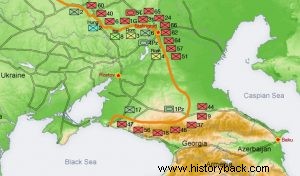
Germany does not produce oil. This is a truth that was and still is. In 1939 the country covered 70% of its needs from imports. With the start of World War II, Germany lost access to almost all international oil markets with the exception of that of the Soviet Union, which was opened with the signing of the Ribbentrop-Molotov Pact in August 1939.
Over the course of 18 months, Germany bought 51,000t from the USSR. of oil per month. Thanks to Soviet oil, the German armies carried out their victorious campaigns in Western Europe and the Balkans. But Hitler was not particularly pleased and could not be since he felt dependent on Soviet oil bearing in mind that whenever the Kremlin decided the flow could be stopped.
Oil played an important role in the German dictator's plans for an attack on the USSR, the plans of which began to be drawn up since 1940. On December 21, 1940, Hitler signed Directive 21 outlining his plans to crush the Soviet Union with a blitzkrieg campaign, eventually taking control of the rich oil fields in the Caucasus region.
It is an irony of history that Hitler amassed the oil reserves necessary to attack the USSR thanks to an agreement with Stalin . Without Soviet oil, Hitler could not even think of attacking the USSR!
Operation "Barbarossa", as the attack against the USSR was called, started impressively for the Germans who were however thwarted by space, the volume of the opponent and their own errors. On November 20, 1941, German forces captured Rostov, the city "gateway to the Caucasus", as it was not unjustly described.
However, in the heart of the Russian winter there was little the Germans could do to capitalize on this success. This was followed by defeat at the Battle of Moscow and furious, if uncoordinated, Soviet counter-attacks that forced the Germans onto the defensive. Rostov was recaptured by the Soviets
But the foolhardy, Stalinist-inspired Soviet counter-attacks carried out in the spring of 1942, and especially the disastrous Kharkov counter-attack against German forces on the southern edge of the Eastern Front, wasted Soviet reserves, leaving a huge gap in southeastern Ukraine in which Hitler decided to exploit in order to conquer the oil-bearing region of the Caucasus.
The Germans estimated that 70% of Soviet oil production came from the deposits of the Caucasus, which meant that, beyond any advantages that the conquest of the region would entail for them, it would simultaneously deprive their opponents of the possibility of continuing the war. The thought was not only absurd. However, the problem was its application in practice.
Goering, being responsible, among other things, for the German oil supply, actively influenced Hitler's plans, since in cooperation with the oil company Kontinentale OL AG he indicated that six months after the capture of the Maykop oil fields production would be achieved 30,000t. per month. Others 9,000t. would be produced from Grozny with the ultimate goal of producing 1 million tons by 1943.
The Germans, under Marshal Liszt, managed to advance into the regions of present-day Georgia and Azerbaijan. However, from November 13, 1942, the Soviets began fierce counter-attacks against the German forces. Meanwhile further north, in Stalingrad, Paulus' 6th Army was already surrounded. It was fate that any German reinforcements were directed there.
With the collapse in Stalingrad, however, the German forces on the Caucasus front were also in danger of encirclement. Thus the retreat was decided. The German retreat would begin on January 2, 1943. Hitler's campaign for precious oil had failed.
The failure was painful not only because of the 72,000 personnel losses and the also huge material losses. During the entire period of German occupation of the wider area, it was not possible to extract significant amounts of oil. And that was exactly the problem.
The German campaign in the oil-bearing Caucasus region was undermined by Hitler's failure to commit sufficient forces, who preferred to involve German forces in the slaughter of Stalingrad. If Liszt's forces had been strengthened from the start they could have broken the Soviet resistance in the Kuban more quickly and reached the contested Black Sea ports of Tuapse and Sukhumi.
In this particular campaign, beyond all other factors, the catalyst was time. And this factor was not respected by the Germans neither during the initial design nor during the execution of the operation. Liszt's handling of the battle was also problematic. Evidently sensational moves, such as the "conquest" of the highest peak of the Caucasus Elbrus by German mountain hunters had no practical significance.
On the Soviet side, the battle was fought with heavily overstretched forces, initially, who would not have been able to hold off the Germans, even if their commands had not committed errors, as many did. Nevertheless they held on and finally prevailed due to the German collapse at Stalingrad , although they suffered in the Caucasus campaign over 500,000 casualties.
The inability of the Germans to conquer the oil-bearing region condemned them to a permanent poverty of fuel, the result of which was, to a large extent, the loss of the war.

